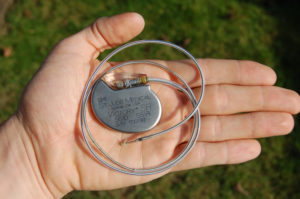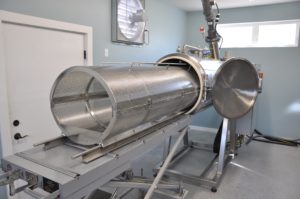Today, SevenPonds speaks with Philip Olson, an assistant professor of Science and Technology in Society at Virginia Tech. Olson researches bioethics and environmental ethics, analyzing society’s complex relationship with new technologies. He has a particular interest in the study of alkaline hydrolysis. Over the years, Olson has studied how receptive people are to this new technology.
Warning: This post contains detailed information about how remains are processed. Reader discretion is advised.

Credit: sts.vt.edu
Marissa Abruzzini: What type of energy does alkaline hydrolysis use?
Philip Olson: You just plug it in. It’s all run on electricity through a hot water heater.
Marissa: Is the energy requirement for alkaline hydrolysis less than that of standard cremation?
Philip: It’s much, much, much less than cremation. Here’s the thing though: Your energy bill will be low, but your water bill will go through the roof. Alkaline hydrolysis uses a lot of water. You have to fill the entire cylinder up with water twice or even three times every day. And if you’re using this in a place like southern California, you’re gonna run into some issues. There’s been a lot of water rationing happening there.
Drinkable water is a serious security issue. Alkaline hydrolysis isn’t this panacea for the funeral industry.
Marissa: Do you personally consider alkaline hydrolysis to be ecologically safe?
Philip: I can’t give a definitive answer for this. I will say that it uses a lot less energy than cremation. But at the same time, alkaline hydrolysis still uses electricity that comes from a coal power plant. You’re using less fossil fuels than you are with a standard cremation, but you’re also using a lot more water. The ecological impact depends on the seriousness of those interests. You have to consider which is the more pressing issue at the moment.
Marissa: On the subject of environmental safety, one of the problems with standard cremation is that dental fillings can burn, and the mercury inside gets released into the air. What happens to dental fillings in alkaline hydrolysis?

Credit: Wikimedia.org
You don’t need to remove pacemakers in alkaline hydrolysis.
Philip: Teeth don’t hydrolyze — they’re part of the bone matter that’s left behind. But the fillings inside of the teeth won’t hydrolyze either. Fillings fall off of the teeth because the teeth become very brittle at the end of the process. All of these fillings and implants come out completely clean. You don’t even have to remove pacemakers, which is something you have to do with cremation. At the end of the alkaline hydrolysis process, all of these implants are filtered out before the bones dry.
Marissa: When did alkaline hydrolysis become a legal tool for decomposing human remains? Is this a relatively new process?
Philip: The first time was in Ohio in 2011. A funeral director named Jeff Edwards heard about this process for decomposing animal remains. He noticed that there weren’t any regulations in his state that said he couldn’t use this for human remains. He presented it to the board in his state, and just started doing it. Within a short period of time, he processed 19 bodies with this method. What’s so interesting to me is that he received a ton of interest, even though he only used it for a few months. But, just before he did his 20th round of alkaline hydrolysis, the Ohio Board of Health shut him down.
Marissa: Why do you think they shut him down?
Philip: Some people think alkaline hydrolysis sounds awful. They compare it to Soylent Green.
Marissa: Since alkaline hydrolysis is legal in some states, people are clearly interested in it. Why do people choose this method over cremation?
Philip: The vast majority of people choose this process not because it’s greener than cremation, but because they think it’s more gentle. They get the same end product that cremation produces (the “ashes”) without the fire. Fire for many people conjures up visions of hell. So instead of putting grandma on a fire, grandma is taking a warm bath. I guess they think it’s gentler to soak in caustic alkali.
Marissa: How do you feel about the funeral industry calling this process “flameless cremation?” Is this accurate?

An alkaline hydrolysis machine
Credit: frazerconsultants.com
Philip: I compare this debate to the debate over whether same-sex marriage is really “marriage.” We assume that cremation means that you need to have flames or fire. In reality, cremation is just a legal definition for processing remains. Like marriage, it’s a socially constructed definition. You end up with the exact same end product in both cremation and alkaline hydrolysis. And you’re not really getting “ashes” in either process. But the important issue for me is how the state chooses to legalize it. If it’s not “cremation,” then will they regulate it differently? That’s the question I care about.
Marissa: Why do some people have a difficult time accepting alkaline hydrolysis, even though they readily accept cremation?
Philip: People get metaphysical about this issue. It reveals a lot about our death care culture. We have this desire to make new technology feel more familiar and more natural. People used to say the same things about cremation that they’re saying now about alkaline hydrolysis. What’s funny is that neither of these things are what actually happens to a body in the ground. There’s nothing “natural” about either of them.
Marissa: Would you consider using this process yourself after you die?
Philip: It interests me, but ideally, I’d like to have a green burial. I see the manipulation of bodies as unnecessary. But if my family really wanted cremation or alkaline hydrolysis, then that’s fine. And I would just ask that they understand the water security issue, and our use of nonrenewable fossil fuels. Alkaline hydrolysis isn’t immune to criticism.
If you’d like to find out whether alkaline hydrolysis is legal and available in your state, you can find more information on Nolo.com.
You can read Part One of our interview with Philip Olson here.

 Is Alkaline Hydrolysis Good for the Environment?
Is Alkaline Hydrolysis Good for the Environment?


 Our Monthly Tip: Make an “In Case of Death” File to Ease Loved One’s Grief
Our Monthly Tip: Make an “In Case of Death” File to Ease Loved One’s Grief
 Passing of Beloved Comedian Births a New Comedy Festival
Passing of Beloved Comedian Births a New Comedy Festival















